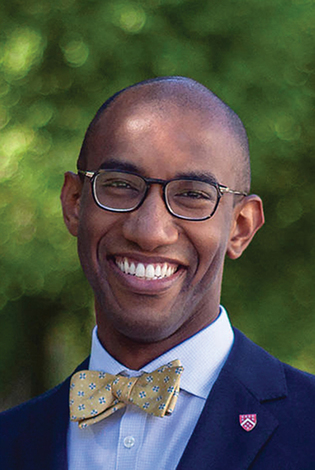
Office of LGBTQ resources
No matter the occasion, Andrew Dowe was always beautifully dressed. David A. D. Evans, head of Berkeley College, has put up a memorial portrait in Berkeley’s Mendenhall Room, where Andrew led seniors’ discussions of their work. The college has renamed its senior thesis prize after him, and Yale has created an Andrew Dowe Memorial Fund.
View full image
I first met Andrew Dowe ’08, ’20PhD, around 2015, when we were both on a panel interviewing students trying for scholarships. Andrew wasn’t merely friendly, welcoming, kind, and witty; he had the most joyfully warm personality of anyone I’ve ever met. However you were feeling, however difficult or overloaded your day might have been, Andrew’s smile and conversation would lift you up. He was incandescent.
Andrew died on January 31. He was only 34. David Evans, head of Berkeley College, sent the news to Berkeley students and fellows on February 1. It was shocking, incomprehensible, to see Andrew’s name in a sentence that included the words “heavy heart” and “unexpected passing.” (His obituary said natural causes brought on his death.) Vice President Kim Goff-Crews ’83, ’86JD, held an online gathering that evening. The Zoom meeting was at full capacity, with 300 attendees, and more hoping to join. Several people spoke, movingly. Many cried. Dozens of memories flowed into the chat box. A member of Andrew’s PhD cohort wrote that he could “change the energy in any room without taking up all of the oxygen.” One woman remembered him attending a party during a blizzard: “Andrew showed up for people, especially when there was dancing involved.” Another: “He was joy personified.”
As an undergrad, Andrew had majored in African American Studies and Women’s, Gender, and Sexuality Studies (WGSS). He earned his BA with distinction and received a prize for outstanding work. He took an MA in teaching at Lehman College–CUNY (and taught and mentored high schoolers in the Bronx), and then returned to Yale for his PhD in African American Studies and American Studies.
For most people, that would have been plenty. But throughout, Andrew also taught, worked, and volunteered—copiously. He was the director of undergraduate studies for WGSS. He was a dedicated adviser to students at Berkeley. He had served or was serving on ten major committees.
When senior lecturer Maria Trumpler ’92PhD first met Andrew, he was an undergrad, and “already a leader in the LGBTQ community.” Trumpler established and directs Yale’s Office of LGBTQ Resources. In 2010, she made him assistant director; in 2016, associate director. Andrew took the main role in designing the office as a welcoming space. (After he died, she took his mother to see it. Trumpler felt “so much of him in that space that I actually felt comforted.”) She adds that he was “a phenomenal teacher”—by spring 2016 he was teaching two courses per semester—and a “creative, expansive” thinker. His dissertation explored two kinds of cruising in the Caribbean: white tourists arriving on ships; gay men finding places to connect with each other.
Andrew was the kind of mentor every one of us needed in our youth. Since 2010, he had managed Berkeley’s Mellon Forum, in which seniors gather to discuss their work. David Evans remembers him directing the colloquies with “positivity and encouragement, laughter and joy.” Xán Miñán ’20 says, “I don’t think that ever once Andrew let me leave a conversation thinking that I couldn’t do something that I really wanted to do.” If Xán hesitated over a project he liked, Andrew would say, in his sonorous baritone, “Well, have you considered thinking about it this way”—shifting the view so that Xán could see a way through. “He would help you draw connections,” Xán says. “He would just kind of nudge you, and it would make a world of difference.”
One speaker at the February 1 Zoom gathering expressed how very much we’ve lost, in losing Andrew: “It was his calling to remind people of how special they are, and the potential that they have. It was his calling to empower people to live in their authenticity, in their fullness, and to remind them to create joy, and to hold on to it.”
 loading
loading
1 comment
-

Elizabeth Herrera, 1:11am May 12 2021 |  Flag as inappropriate
Flag as inappropriate
The comment period has expired.I like to think that when a person like Andrew leaves this earth. It's because he has gone on to something bigger after having left a major footprint. May he Rest In Peace and may his family remain peaceful.